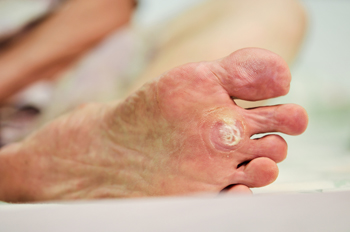 Plantar warts, caused by the human papillomavirus, or HPV, are growths that appear on the soles of the feet. These warts thrive in warm, moist environments like public showers, locker rooms, and swimming pools, making them easy to contract in such places. The virus enters the skin through small cuts or abrasions, leading to the development of warts that can be painful and unsightly. Symptoms include rough, grainy lesions on the soles of the feet, often with black pinpoints, which are tiny blood vessels. Plantar warts can cause discomfort, especially while walking or standing for extended periods. Relief options can include salicylic acid, cryotherapy, freezing the wart, or laser therapy. Maintaining good foot hygiene and wearing protective footwear in public areas may help to prevent plantar warts. If you think you have a plantar wart and mild treatments are ineffective or the wart is particularly painful, it is suggested that you consult a podiatrist to ensure proper care.
Plantar warts, caused by the human papillomavirus, or HPV, are growths that appear on the soles of the feet. These warts thrive in warm, moist environments like public showers, locker rooms, and swimming pools, making them easy to contract in such places. The virus enters the skin through small cuts or abrasions, leading to the development of warts that can be painful and unsightly. Symptoms include rough, grainy lesions on the soles of the feet, often with black pinpoints, which are tiny blood vessels. Plantar warts can cause discomfort, especially while walking or standing for extended periods. Relief options can include salicylic acid, cryotherapy, freezing the wart, or laser therapy. Maintaining good foot hygiene and wearing protective footwear in public areas may help to prevent plantar warts. If you think you have a plantar wart and mild treatments are ineffective or the wart is particularly painful, it is suggested that you consult a podiatrist to ensure proper care.
Plantar warts can be very uncomfortable. If you need your feet checked, contact Brock Liden, DPM from Ohio. Our doctor will assist you with all of your foot and ankle needs.
About Plantar Warts
Plantar warts are the result of HPV, or human papillomavirus, getting into open wounds on the feet. They are mostly found on the heels or balls of the feet.
While plantar warts are generally harmless, those experiencing excessive pain or those suffering from diabetes or a compromised immune system require immediate medical care. Plantar warts are easily diagnosed, usually through scraping off a bit of rough skin or by getting a biopsy.
Symptoms
- Lesions on the bottom of your feet, usually rough and grainy
- Hard or thick callused spots
- Wart seeds, which are small clotted blood vessels that look like little black spots
- Pain, discomfort, or tenderness of your feet when walking or standing
Treatment
- Freezing
- Electric tool removal
- Laser Treatment
- Topical Creams (prescription only)
- Over-the-counter medications
To help prevent developing plantar warts, avoid walking barefoot over abrasive surfaces that can cause cuts or wounds for HPV to get into. Avoiding direct contact with other warts, as well as not picking or rubbing existing warts, can help prevent the further spread of plantar warts. However, if you think you have developed plantar warts, speak to your podiatrist. He or she can diagnose the warts on your feet and recommend the appropriate treatment options.
If you have any questions please feel free to contact our office located in Circleville, OH . We offer the newest diagnostic and treatment technologies for all your foot and ankle needs.
